
- We will send in 10–14 business days.
- Author: Curtis Marez
- Publisher: New York University Press
- ISBN-10: 1479836729
- ISBN-13: 9781479836727
- Format: 15 x 22.6 x 2.5 cm, softcover
- Language: English
- SAVE -10% with code: EXTRA
Reviews
Description
Makes visible the hidden social costs of TV production for local Black, Latinx, and Indigenous communities
Producing Precarity is a long-overdue examination of the television industry's practice of "offshoring" production to impoverished sites within the US. The author, Curtis Marez, focuses on state efforts to attract film and TV producers to poor places with tax incentives, discounted public lands, and subsidized infrastructures. He argues that these efforts result in the redistribution of wealth from poor people of color, Indigenous people, and other taxpayers to Los Angeles-based media makers, while also diverting money that could be used for education and health care to the wealthy. The popular series produced in these places, such as Breaking Bad, The Watchmen, Lovecraft County, The Walking Dead, and Vida, are praised by critics and awards organizations and highlighted by streaming services for challenging genre, casting, and narrative conventions. However, many of these shows rely on racialized and gendered low-wage labor for production, and diversity, equity, and inclusion representations can sometimes perpetuate repression, such as depicting police as diversity champions. Producing Precarity examines how contemporary streaming shows from these areas promote racial inequality in ideology and content, as well as materially through their local production methods, and perceptually through streaming distribution modes that discourage viewers from understanding how TV is made. Marez also provides examples of local resistance, including movements against a police training center and a film studio in Atlanta, as well as anti-gentrification movements in Latinx neighborhoods of LA.EXTRA 10 % discount with code: EXTRA
The promotion ends in 17d.05:32:26
The discount code is valid when purchasing from 10 €. Discounts do not stack.
- Author: Curtis Marez
- Publisher: New York University Press
- ISBN-10: 1479836729
- ISBN-13: 9781479836727
- Format: 15 x 22.6 x 2.5 cm, softcover
- Language: English English
Makes visible the hidden social costs of TV production for local Black, Latinx, and Indigenous communities
Producing Precarity is a long-overdue examination of the television industry's practice of "offshoring" production to impoverished sites within the US. The author, Curtis Marez, focuses on state efforts to attract film and TV producers to poor places with tax incentives, discounted public lands, and subsidized infrastructures. He argues that these efforts result in the redistribution of wealth from poor people of color, Indigenous people, and other taxpayers to Los Angeles-based media makers, while also diverting money that could be used for education and health care to the wealthy. The popular series produced in these places, such as Breaking Bad, The Watchmen, Lovecraft County, The Walking Dead, and Vida, are praised by critics and awards organizations and highlighted by streaming services for challenging genre, casting, and narrative conventions. However, many of these shows rely on racialized and gendered low-wage labor for production, and diversity, equity, and inclusion representations can sometimes perpetuate repression, such as depicting police as diversity champions. Producing Precarity examines how contemporary streaming shows from these areas promote racial inequality in ideology and content, as well as materially through their local production methods, and perceptually through streaming distribution modes that discourage viewers from understanding how TV is made. Marez also provides examples of local resistance, including movements against a police training center and a film studio in Atlanta, as well as anti-gentrification movements in Latinx neighborhoods of LA.

Reviews